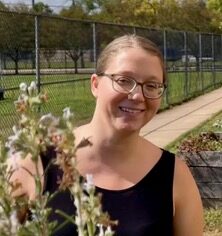PPS Welcomes New Food Service Supplier, Food Systems Coordinator
By Donald Gilpin

Shannon Barlow
Princeton Public Schools (PPS) is starting the 2024-25 school year with a new food systems literacy coordinator, Shannon Barlow, and a new food service supplier, Pomptonian, that offers unlimited servings of fruits and vegetables to accompany each meal.
Those changes at PPS signal a whole new perspective on the significance of food, its role in school, and its role in the lives of the school community, according to PPS Science Supervisor Joy Barnes-Johnson.
“These paired developments will, over time, fundamentally change the way that all of us at the district — students, parents, faculty, staff, and administration — understand and use food for curriculum, health, wellness, community, and for the good of natural systems that are prerequisites to all life,” said Barnes-Johnson, as quoted in a press release from Princeton School Gardens Cooperative, Inc. (PSGC), which is collaborating with PPS to use campus resources to illustrate and amplify curriculum.
Barnes-Johnson continued, “Food has myriad roles in our lives, and it connects to nearly every academic subject. We are developing this program so that we can connect and strengthen our own district across all six campuses and then share everything we’ve learned with other districts to connect and strengthen them.”
As the new coordinator Barlow, who is a public health specialist, will be using food, water, and land systems on PPS campuses and drawing on the Teaching Kitchens and the diversity of the students to help illustrate and amplify curriculum. She is engaging faculty, staff, administration, and facilities in working to restore ecological systems on campus and nurturing the well-being of the student body.
Barlow’s priorities, according to the press release, include, coordinating school foods with curriculum, seasons, student demographics, and making full use of the District’s Edible Gardens at all of the six campuses; strengthening the district’s Garden State on Your Plate farm-to-table program, which celebrates a produce item every month in all the school cafeterias and makes sure the item is served twice a week as part of the National School Lunch Program and represents world cuisines and cultures. Additionally, her priorities include implementing and developing, in collaboration with the community’s water flow experts, the capture and conservation of water for irrigation of Edible Gardens and for plantings of native perennials; and facilitating and maintaining, along with the Princeton Environmental Commission and other nonprofits, multiple-layered micro food forest plantings that support biodiversity, pollinators, and habitat creation.
Pomptonian, the new food service company, features the Farm Stand fruit and vegetable program, including the spotlighting of at least one produce item each month.
“We are eager to build enthusiasm and participation in the National School Lunch and School Breakfast programs, and to illustrate and amplify curriculum with both,” said PPS Business Administrator Matthew Bouldin. “At the same time we want to bring some of our district’s existing resources into the spotlight. We live in the Garden State. What better way to celebrate both than on school lunch trays?”
Barlow, who joined the district this August, has previous experience in project management of food systems literacy efforts and in curriculum development on climate change, the food system, nutrition, and physical literacy.
She also has experience in review of grants and financial reports, and she has conducted food waste research and audits. She earned her Master of Public Health from Rutgers School of Public Health and her BA from Rider University. As food systems literacy coordinator, Barlow succeeds Tomia MacQueen, who was the first program coordinator.
“The PSGC fosters equitable garden- and food-based education in the classroom, cafeteria and community,” states the PSGC website. “The PSGC uses local and seasonal foods to connect students to their own bodies, to each other, to their families and communities, to curriculum, and to the world and its climate.”
It continues, “Our vision: All graduates, and by extension, their parents, know how to grow a salad, read a label, set a table, cook for their community, and understand that their choices help shape the future that we share.”

